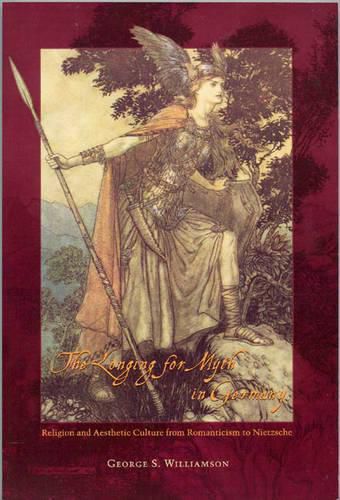Readings Newsletter
Become a Readings Member to make your shopping experience even easier.
Sign in or sign up for free!
You’re not far away from qualifying for FREE standard shipping within Australia
You’ve qualified for FREE standard shipping within Australia
The cart is loading…






Since the dawn of Romanticism, artists and intellectuals in Germany have maintained an abiding interest in the gods and myths of antiquity while calling for a new mythology suitable to the modern age. In this study, George S. Williamson examines the factors that gave rise to this distinct and profound longing for myth. In doing so, he demonstrates the entanglement of aesthetic and philosophical ambitions in Germany with some of the major religious conflicts of the nineteenth century. Through readings of key intellectuals ranging from Herder and Schelling to Wagner and Nietzsche, Williamson highlights three crucial factors in the emergence of the German engagement with myth: the tradition of Philhellenist neohumanism, a critique of contemporary aesthetic and public life as dominated by private interests, and a rejection of the Bible by many Protestant scholars as the product of a foreign, Oriental culture. According to Williamson, the discourse on myth in Germany remained bound up with problems of Protestant theology and confessional conflict through the nineteenth century and beyond. A compelling adventure in intellectual history, this study uncovers the foundations of Germany’s
$9.00 standard shipping within Australia
FREE standard shipping within Australia for orders over $100.00
Express & International shipping calculated at checkout
Since the dawn of Romanticism, artists and intellectuals in Germany have maintained an abiding interest in the gods and myths of antiquity while calling for a new mythology suitable to the modern age. In this study, George S. Williamson examines the factors that gave rise to this distinct and profound longing for myth. In doing so, he demonstrates the entanglement of aesthetic and philosophical ambitions in Germany with some of the major religious conflicts of the nineteenth century. Through readings of key intellectuals ranging from Herder and Schelling to Wagner and Nietzsche, Williamson highlights three crucial factors in the emergence of the German engagement with myth: the tradition of Philhellenist neohumanism, a critique of contemporary aesthetic and public life as dominated by private interests, and a rejection of the Bible by many Protestant scholars as the product of a foreign, Oriental culture. According to Williamson, the discourse on myth in Germany remained bound up with problems of Protestant theology and confessional conflict through the nineteenth century and beyond. A compelling adventure in intellectual history, this study uncovers the foundations of Germany’s